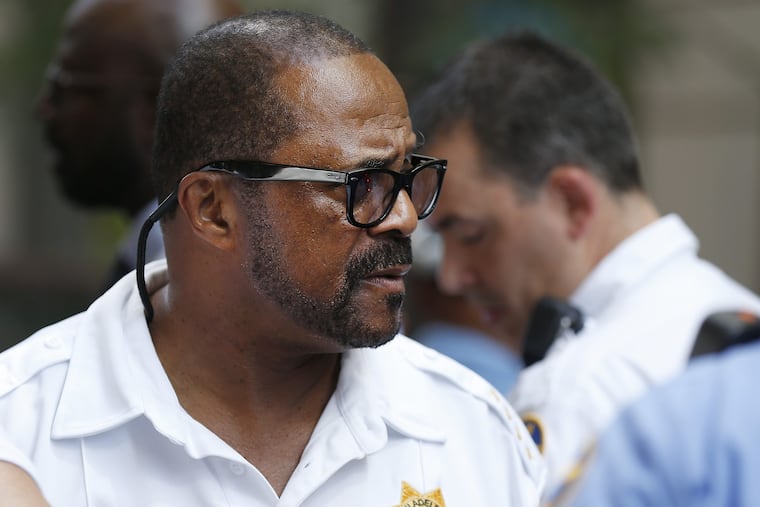A sexual harassment complaint against Sheriff Jewell Williams was substantiated this year, documents show
In January, a representative of the Mayor's Office of Labor Relations informed Williams in a letter that the employee's allegations of a hostile work environment were substantiated following a "thorough investigation" involving interviews with the sheriff and other witnesses. The letter appears to represent the first time an independent investigation confirmed Marlaina Williams' allegations of sexual misconduct against the sheriff.

Philadelphia Sheriff Jewell Williams made inappropriate comments that violated the city's sexual harassment policy, an internal investigation completed earlier this year found, corroborating claims made by a former staffer and leading to new calls from city officials for the sheriff to resign.
The internal complaint against the sheriff was filed with the city in the summer of 2017 by Marlaina Williams, who in April also sued the city in federal court, claiming the sheriff subjected her to four years of sexual harassment. In January, a representative of the Mayor's Office of Labor Relations informed Marlaina Williams in a letter that her allegations of a hostile work environment were substantiated following a "thorough investigation" involving interviews with the sheriff and other witnesses.
The letter, which was included in the April suit, appears to represent the first time an independent investigation confirmed Marlaina Williams' allegations of sexual misconduct against the sheriff. Williams, who is not related to Jewell Williams, is one of at least three women who have accused him of sexual harassment or misconduct.
Mayor Kenney, after signing an executive order Thursday instituting a new sexual harassment policy for executive branch employees, renewed his earlier call for the sheriff to resign. A spokesperson for City Controller Rebecca Rhynhart said she also was calling on Williams to step down. Kenney said there was little city officials could do, adding, "We cannot force out any elected officials."
But, he said, "we have a major job interview and decision come May of 2019 on what will happen with the sheriff," referring to the Democratic primary. The sheriff's term ends in January 2020.
The sheriff, who has been in office since 2012, has denied the allegations. In a statement, his office said it could not comment on the specifics of the case because of unresolved litigation.
"I would hope that people would let due process prevail, because I am sure that I will be vindicated in the final analysis," the statement said, adding that since January, all Sheriff's Office staff had completed sexual harassment training.
The case was a touch point Thursday for Rhynhart, whose office released an audit looking into the city's sexual harassment prevention policy. During a news conference, she said the city's policy stipulated that copies of completed investigations must go to the department head and the cabinet official who oversees that department.
As a result, her office's audit indicated that the completed, "substantiated" case file against the sheriff was delivered to him earlier this year. The city's sexual harassment policy, which Kenney said was overhauled Thursday, had required investigators, upon completion of such a probe, to forward the entire investigation file to other city stakeholders along with "the department head's written conclusion and recommendation." The sheriff is the head of his department, though it's unclear whether he ultimately wrote a conclusion in his own case.
The city disputes the controller's characterization. Mike Dunn, a spokesperson for the administration, said the Controller's Office erred when it wrote that the case file was sent to the Sheriff's Office. He said only the letter of finding was passed to the Sheriff's Office.
City officials have not made public the final investigation report. Dunn said making documents related to internal investigations public "would deter other complainants from coming forward with their allegations."
The letter to Marlaina Williams indicated that the Office of Human Resources was also informed of the results of the investigation and "may take remedial action that they deem appropriate." The city did not respond to questions about whether the office took any such action.
Members of Kenney's administration contend the new sexual harassment policy will improve these processes by establishing a new oversight structure.
Rhynhart said the case against Jewell Williams is indicative of deeper problems in how the city has handled complaints of sexual harassment and misconduct.
"There are employees in different supervisory positions in the city that have sexually harassed employees that continue to work for the city," she said, "and that's not OK, and it's not just about one person."
In the complaint filed against the city in federal court, attorneys representing Marlaina Williams said the sheriff "expressed his sexual interest" in her through comments and, on multiple occasions, summoned her to his office and attempted to kiss her.
The woman alleges that by December 2013, the harassment changed after the sheriff became aware she was in a relationship with another employee. The sheriff, Marlaina Williams says, expressed his disapproval by saying things like, "I'm jealous that he gets to go home with you and not me," "You should leave him and be with me," and "I haven't had sex in two years, so if I'm not happy no one's gonna be happy."
Marlaina Williams, who is Muslim, also alleged the sheriff made anti-Muslim statements. She left her job at the Sheriff's Office in June 2017.
Another woman, Vanessa Bines, filed a similar lawsuit last year alleging Williams and a deputy sheriff had sexually harassed her for two years while she worked in the office. She claimed Williams retaliated against her after she rejected his advances.
In 2012, the Democratic Caucus of the state House of Representatives paid a third woman $30,000 to settle a similar lawsuit in which Williams was accused of sexual misconduct while he was a state representative.